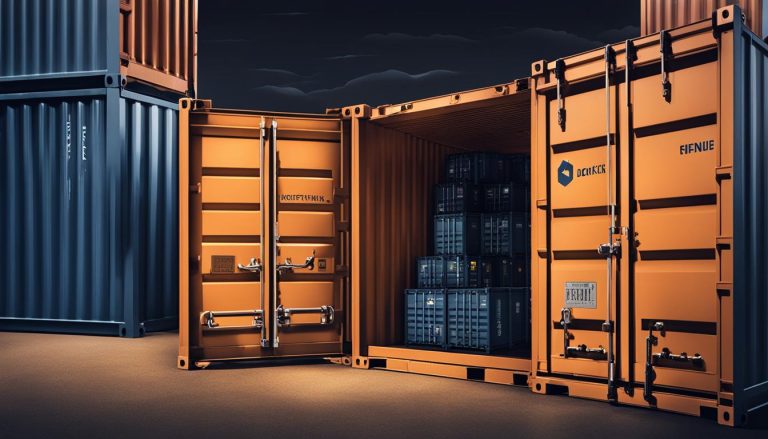In today’s digital age, protecting our networks from cyber threats is of paramount importance. One essential tool in the realm of network security is a firewall. But what exactly is a firewall? How does it work? And why is it vital for safeguarding our sensitive data and online activities? In this article, I will provide a comprehensive overview of firewalls, their functions, and their significance in ensuring network security.
Key Takeaways
- A firewall is a computer network security system that acts as a barrier between a private network and the internet.
- It selectively allows or blocks data packets based on set rules, protecting against malicious network traffic.
- Firewalls can be hardware or software-based, with hardware firewalls offering additional defense for multiple computers.
- They provide essential functions such as Network Address Translation (NAT) and Virtual Private Network (VPN) to enhance security.
- Next Generation Firewalls (NGFW) offer advanced features like deep packet inspection and targeted security policies.
What Do Firewalls Do?
Firewalls play a critical role in ensuring network security by protecting against cyber attackers and filtering network traffic. They act as a barrier between a private network and the internet, selectively allowing or blocking data packets based on set rules. By monitoring and filtering internet traffic, firewalls prevent malicious software from accessing a computer or network.
Firewalls have various security features and technologies that enhance their effectiveness. These include network threat prevention, application and identity-based control, hybrid cloud support, and scalable performance. By leveraging these features, firewalls can establish specific policies to allow or block incoming and outgoing traffic, significantly enhancing overall security.
Firewalls provide granular control over network traffic, allowing organizations to configure them to block data from specific locations, applications, or ports. They can also detect and prevent unauthorized access, protecting against malware and application-layer attacks. By using firewalls as part of their security infrastructure, organizations can enforce security policies, detect invasive or suspicious activity, and prevent unauthorized web activities.
Implementing firewalls, especially Next Generation Firewalls (NGFW), alongside other protective measures, is crucial in strengthening network security. NGFWs offer advanced features like deep packet inspection and threat prevention technologies, enabling organizations to stay ahead of emerging cyber threats. By embracing the capabilities of firewalls, organizations can safeguard their networks and sensitive data from potential attacks.
| Firewall Technologies | Features |
|---|---|
| Network Threat Prevention | Avoids potential network threats by identifying and blocking suspicious activity |
| Application and Identity-based Control | Offers granular control over network traffic, allowing specific applications and user identities to be allowed or blocked as per policies |
| Hybrid Cloud Support | Provides security for networks that span across both on-premises and cloud environments |
| Scalable Performance | Ensures consistent and efficient firewall performance, even in high-traffic environments |
Types of Firewalls
Firewalls are essential network security systems that protect against cyber threats by selectively allowing or blocking network traffic based on predefined rules. There are different types of firewalls available, each with its own approach to filtering network traffic.
Packet Filtering Firewalls
Packet filtering firewalls analyze a small amount of data according to predefined standards. They examine packet headers, such as source and destination IP addresses and ports, and allow or block packets based on these criteria. While packet filtering firewalls are generally fast and efficient, they lack the ability to inspect packet contents, making them more susceptible to certain types of attacks.
Proxy Service Firewalls
Proxy service firewalls act as intermediaries between the user’s device and the internet. They filter messages at the application layer, making decisions based on the content of the messages. By analyzing the application protocols, proxy service firewalls provide more granular control over traffic. However, they can introduce latency due to the additional processing involved.
Stateful Inspection Firewalls
Stateful inspection firewalls dynamically monitor active connections to determine which packets to allow through. They keep track of the state of each connection by analyzing packet headers and comparing them to established rules. Stateful inspection firewalls offer better protection than packet filtering firewalls as they consider the context of network traffic. However, they may require more processing power and memory.
Next Generation Firewalls
Next Generation Firewalls (NGFW) combine the functionalities of traditional firewalls with advanced features. They perform deep packet inspection with application-level inspection, allowing for more targeted security policies. NGFWs can identify specific applications and apply specific rules accordingly. Additionally, they often include threat prevention technologies such as intrusion prevention systems (IPS) and antivirus software to detect and prevent malware and other threats.
How Does a Firewall Work?
A firewall is a critical component of network security that operates by selectively allowing or blocking network traffic based on predefined rules. It acts as a barrier between a private network and the internet, analyzing incoming and outgoing data packets to determine their legitimacy and potential threats.
Network Layer Inspection
One of the key mechanisms through which firewalls work is network layer inspection. This involves examining packets at a relatively low level, typically based on IP addresses and ports. By analyzing these attributes, firewalls can determine whether to permit or deny a connection. For example, a firewall may be configured to block packets from certain IP addresses or specific ports associated with known malicious activities.
Application Layer Inspection
In addition to network layer inspection, firewalls can also perform application layer inspection. This process involves inspecting network traffic at a deeper level, focusing on specific application protocols. By analyzing the contents and protocols of data packets, firewalls can make informed decisions about whether to allow or deny access. Application layer inspection provides more granular control and is especially useful in detecting and blocking sophisticated threats that may try to bypass traditional network-level filters.
“Firewalls play a crucial role in maintaining network security by selectively allowing or blocking network traffic based on predefined rules.”
By combining network layer inspection and application layer inspection, firewalls provide a multi-layered defense against unauthorized access, malware, and other cyber threats. They act as a first line of defense for protecting sensitive data and ensuring the integrity of a network’s infrastructure. With the continuous advancements in firewall technologies, organizations can implement robust security measures that keep pace with evolving cyber threats.
The Importance of Firewalls
Firewalls play a vital role in ensuring network security and protecting against cyber threats. Implementing a firewall system provides numerous benefits and is an essential component of any organization’s security strategy.
One of the key benefits of using a firewall is its ability to prevent unauthorized access to a network. By acting as a barrier between a private network and the internet, firewalls restrict internet traffic and selectively allow or block data packets based on predefined rules. This blocks malicious or unnecessary network traffic, preventing cyber attackers from infiltrating the network.
“Firewalls are essential tools in maintaining network security and protecting against cyber threats.”
Furthermore, firewalls enhance overall online safety by protecting against malware and application-layer attacks. They can detect and combat attacks across the network by leveraging an integrated intrusion prevention system (IPS). By enforcing security policies, detecting invasive or suspicious activity, and preventing unauthorized web activities, firewalls provide a robust defense against various cyber threats.
| Benefits of Firewalls |
|---|
| Prevents unauthorized access to a network |
| Protects against malware and application-layer attacks |
| Enforces security policies |
| Detects and prevents invasive or suspicious activity |
Additionally, firewalls offer essential functions such as Network Address Translation (NAT) and Virtual Private Network (VPN). NAT hides internal IP addresses and protects data while traversing public networks, ensuring privacy and data integrity.
In conclusion, firewalls are crucial for maintaining network security and safeguarding sensitive data. They provide multiple benefits, including preventing unauthorized access, protecting against cyber threats, enforcing security policies, and offering essential privacy features. Implementing firewalls, especially Next Generation Firewalls, alongside other protective measures, significantly strengthens an organization’s resistance to cyber attacks.
Network Layer vs. Application Layer Inspection
When it comes to firewall inspection methods, organizations have the option to choose between network layer and application layer inspection. Each method has its own advantages and considerations, making it essential to understand the differences to make an informed decision for network security.
Network layer inspection involves filtering packets at a relatively low level based on IP addresses and ports. This method is efficient in terms of performance and can quickly process a large volume of traffic. However, it may allow unwanted applications or malware to pass through allowed ports, potentially compromising network security.
On the other hand, application layer inspection goes deeper into the network traffic, filtering based on specific application protocols. This method provides more granular control over the content that arrives at the machine, allowing for a more targeted approach to security policies. However, application layer inspection can be more resource-intensive and may impact overall network performance.
“The choice between network layer and application layer inspection depends on the specific needs and priorities of the organization. Network layer inspection offers efficiency, while application layer inspection provides greater control and security. It is crucial to strike a balance between performance and protection when configuring a firewall.”
| Network Layer Inspection | Application Layer Inspection |
|---|---|
| Filters packets based on IP addresses and ports | Filters packets based on specific application protocols |
| Efficient in terms of performance | Provides more granular control over content |
| May allow unwanted applications or malware to pass through allowed ports | More resource-intensive and may impact network performance |
Ultimately, the choice between network layer and application layer inspection depends on the specific needs and priorities of the organization. Understanding the advantages and considerations of each method is crucial in configuring a firewall that strikes the right balance between performance and protection.
Next Generation Firewalls and Beyond
Next Generation Firewalls (NGFW) are a significant advancement in firewall technologies, offering more advanced features and enhanced threat prevention capabilities. These firewalls go beyond traditional packet filtering and provide deep packet inspection, allowing for the identification of specific applications. This capability enables organizations to establish more targeted security policies and protect against emerging threats.
With NGFWs, organizations can leverage advanced technologies such as intrusion prevention systems (IPS) and antivirus software to detect and prevent malware and other cyber threats. These firewalls offer a comprehensive approach to threat prevention, ensuring the highest level of security for networks of all sizes.
“The introduction of Next Generation Firewalls has revolutionized network security by providing advanced capabilities to combat sophisticated cyber threats.”
As the cybersecurity landscape continues to evolve, Next Generation Firewalls will remain a crucial component of any organization’s security strategy. NGFWs are designed to support data centers, networks, and cloud environments, offering seamless protection across varying infrastructure. By embracing the capabilities of NGFWs and staying ahead of emerging threats, organizations can safeguard their networks and sensitive data.
| Feature | Advantages | Disadvantages |
|---|---|---|
| Deep Packet Inspection | – Provides granular control over network traffic – Enables the identification of specific applications |
– Resource-intensive – May impact performance |
| Intrusion Prevention Systems (IPS) | – Detects and prevents intrusion attempts – Provides real-time threat prevention |
– Requires regular updates – Can generate false positives |
| Cloud Support | – Facilitates secure connectivity for cloud-based applications – Ensures consistent security policies |
– Dependency on cloud provider – Potential performance impact |
Next Generation Firewalls offer organizations an advanced and comprehensive solution to network security. By leveraging their capabilities, organizations can enhance threat prevention and protect their networks from evolving cyber threats.
Conclusion
Firewalls are essential in maintaining network security and protecting against cyber threats. Understanding the different firewall technologies and their capabilities is crucial for organizations to make informed decisions when implementing security solutions. Next Generation Firewalls (NGFW) offer advanced features, such as deep packet inspection and targeted security policies, going beyond traditional firewalls.
It is important to note that firewalls should be part of a comprehensive security strategy. While NGFWs provide enhanced threat prevention, organizations should also employ other protective measures and follow good security practices. This multi-layered approach greatly strengthens resistance to cyber attacks, ensuring the safety of networks and sensitive data.
In the ever-evolving cybersecurity landscape, Next Generation Firewalls will continue to play a vital role. With their ability to support various environments, including data centers, networks, and the cloud, NGFWs are an indispensable component of any organization’s security solution. By leveraging the capabilities of firewall technologies, organizations can stay ahead of emerging threats and safeguard their networks effectively.
FAQ
What is a firewall?
A firewall is a computer network security system that acts as a barrier between a private network and the internet. It restricts internet traffic, selectively allowing or blocking data packets based on set rules.
How do firewalls protect against cyber attackers?
Firewalls protect against outside cyber attackers by shielding the network from malicious or unnecessary network traffic. They can be hardware or software-based, with hardware firewalls providing an additional line of defense for multiple computers and software firewalls offering more specific control over individual applications.
Do firewalls guarantee complete security?
No, firewalls do not guarantee complete security. However, when used in conjunction with other protective measures, they can significantly strengthen resistance to attacks.
What types of firewalls are available?
There are different types of firewalls available, including packet filtering firewalls, proxy service firewalls, stateful inspection firewalls, and Next Generation Firewalls. Each type has its own approach to filtering network traffic.
How do firewalls work?
Firewalls selectively allow or block network traffic based on predefined rules. They filter packets at different levels of the TCP/IP protocol stack, such as the network layer or the application layer.
What is the importance of firewalls?
Firewalls play a crucial role in ensuring network security. They help protect against malware and application-layer attacks, enhance overall online safety, enforce security policies, and prevent unauthorized web activities.
What is the difference between network layer inspection and application layer inspection?
Network layer inspection involves filtering packets based on IP addresses and ports, while application layer inspection goes deeper into the network traffic, filtering based on specific application protocols. Network layer inspection is more efficient in terms of performance, while application layer inspection provides more granular control over the content that arrives at the machine.
What are Next Generation Firewalls?
Next Generation Firewalls (NGFW) are advanced firewalls that go beyond traditional packet filtering. They offer deep packet inspection, can identify specific applications, and include threat prevention technologies such as intrusion prevention systems (IPS) and antivirus software.
Hi, I’m Mark, the author of Clever IT Solutions: Mastering Technology for Success. I am passionate about empowering individuals to navigate the ever-changing world of information technology. With years of experience in the industry, I have honed my skills and knowledge to share with you. At Clever IT Solutions, we are dedicated to teaching you how to tackle any IT challenge, helping you stay ahead in today’s digital world. From troubleshooting common issues to mastering complex technologies, I am here to guide you every step of the way. Join me on this journey as we unlock the secrets to IT success.


